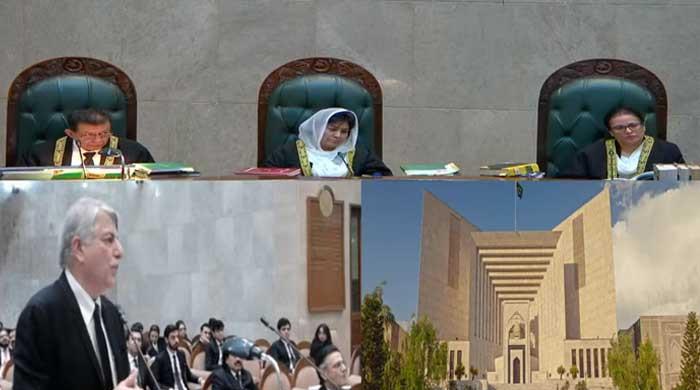
Only the Constitutional Bench Can Hear Matters Related to Constitutional Amendments: Justice Mazhar's Observations on the 26th Amendment Case
On October 13, 2025, the Supreme Court of Pakistan convened a constitutional bench to deliberate on the 26th Constitutional Amendment case. This significant event in the realm of Pakistani law prompted Justice Muhammad Ali Mazhar to emphasize the unique role of the constitutional bench in hearing matters that directly pertain to constitutional amendments. His remarks underscore the gravity and specificity of constitutional issues, as well as the procedural protocols that govern them.
Understanding the 26th Constitutional Amendment
Before delving into Justice Mazhar's comments, it is crucial to comprehend the context of the 26th Constitutional Amendment. This amendment is part of a series of constitutional changes that aim to address various legal and governance issues in Pakistan. Amendments to the constitution are not just legislative adjustments; they represent fundamental changes to the framework that governs the nation, affecting everything from the rights of citizens to the structure of government.
The 26th Amendment, like its predecessors, highlights the need for careful scrutiny and deliberation by a specially designated constitutional bench. The implications of such amendments can resonate through the legal landscape of the country, making it imperative that they are examined by judges with expertise in constitutional law.
Justice Mazhar's Key Observations
During the proceedings of the 26th Constitutional Amendment case, Justice Muhammad Ali Mazhar articulated that "only the constitutional bench can hear constitutional matters." This statement reflects a profound understanding of the judicial process, particularly regarding the interpretation and application of constitutional law.
The Role of the Constitutional Bench
The constitutional bench is a specialized group of judges within the Supreme Court tasked with addressing cases that have significant implications for the constitution. This bench is designed to ensure that complex constitutional questions are handled by those with a deep understanding of constitutional principles and precedents.
Justice Mazhar's assertion is particularly pertinent in a legal landscape where the interpretation of constitutional provisions can lead to far-reaching consequences. By assigning these matters to the constitutional bench, the Supreme Court aims to uphold the integrity of the constitution and ensure that any amendments or legal interpretations are made with the utmost care and consideration.
Implications of the 26th Amendment
While specifics regarding the 26th Amendment were not detailed in this hearing, the broader implications of constitutional amendments are always significant. Amendments can alter the balance of power among government branches, redefine citizen rights, and even impact the relationship between the state and its citizens.
For instance, if the 26th Amendment introduces new rights or modifies existing ones, the constitutional bench's role becomes even more critical. The bench’s decisions can set legal precedents that shape the future of constitutional law in Pakistan.
Why This Case Matters
The 26th Constitutional Amendment case is not just another legal proceeding; it is a reflection of the evolving nature of constitutional law in Pakistan. As society changes, so too does the need for legal frameworks to adapt. The Supreme Court, through cases like this, plays a vital role in interpreting these changes and ensuring that the constitution remains a living document that reflects the will and needs of the people.
The Public's Interest in Constitutional Matters
Given the profound impact of constitutional amendments on daily life, public interest in such cases is incredibly high. Citizens are often directly affected by changes to their rights and government structures. Therefore, transparency and thorough consideration in these cases are crucial for maintaining public trust in the legal system.
Conclusion
Justice Muhammad Ali Mazhar's remarks during the hearing of the 26th Constitutional Amendment case serve as a reminder of the importance of specialized judicial processes in handling constitutional matters. As the Supreme Court of Pakistan continues to navigate complex legal waters, the role of the constitutional bench remains vital in ensuring that the constitution is interpreted and upheld with the seriousness it deserves.
As we await further developments in the 26th Constitutional Amendment case, it is essential for citizens to stay informed about the implications of such amendments and the judicial processes that govern them. The outcomes of these cases will undoubtedly shape the future of Pakistan's legal landscape.
FAQs
1. What is the 26th Constitutional Amendment?
The 26th Constitutional Amendment is a proposed change to the Pakistani constitution that aims to address specific legal and governance issues. The details of the amendment are subject to judicial review and interpretation by the Supreme Court.
2. What is the role of the constitutional bench in the Supreme Court?
The constitutional bench is a specialized panel of judges in the Supreme Court that specifically handles cases related to constitutional law, ensuring that these significant matters are adjudicated by judges with expertise in this area.
3. Why are constitutional amendments significant?
Constitutional amendments can fundamentally change the legal framework of a country, impacting citizens' rights, the balance of governmental power, and the overall governance of the nation.
4. How does the Supreme Court ensure transparency in constitutional matters?
The Supreme Court conducts hearings on constitutional matters in a public forum, allowing for transparency and public engagement in significant legal issues that affect citizens' lives.
5. What should citizens do to stay informed about constitutional changes?
Citizens should follow reliable news sources, engage with legal analyses, and participate in public discussions to stay updated on constitutional amendments and their implications for society.
Tags
National
